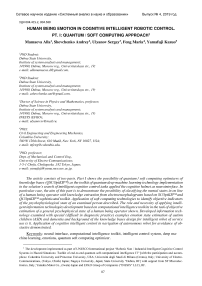Human being emotion in cognitive intelligent robotic control. Pt. I: quantum / soft computing approach
Автор: Mamaeva Alla, Shevchenko Andrey, Ulyanov Sergey, Feng Maria, Yamafuji Kazuo
Журнал: Сетевое научное издание «Системный анализ в науке и образовании» @journal-sanse
Статья в выпуске: 4, 2019 года.
Бесплатный доступ
The article consists of two parts. Part I shows the possibility of quantum / soft computing optimizers of knowledge bases (QSCOptKB™) as the toolkit of quantum deep machine learning technology implementation in the solution’s search of intelligent cognitive control tasks applied the cognitive helmet as neurointerface. In particular case, the aim of this part is to demonstrate the possibility of classifying the mental states in on line of a human being operator with knowledge extraction from electroencephalograms based on SCOptKB™ and QCOptKB™ sophisticated toolkit. Application of soft computing technologies to identify objective indicators of the psychophysiological state of an examined person described. The role and necessity of applying intelligent information technologies development based on computational intelligence toolkits in the task of objective estimation of a general psychophysical state of a human being operator shown. Developed information technology examined with special (difficult in diagnostic practice) examples emotion state estimation of autism children (ASD) and dementia and background of the knowledge bases design for intelligent robot of service use is it. Application of cognitive intelligent control in navigation of autonomous robot for avoidance of obstacles demonstrated.
Neural interface, computational intelligence toolkit, intelligent control system, deep machine learning, emotions, quantum soft computing optimizer
Короткий адрес: https://sciup.org/14123336
IDR: 14123336
Список литературы Human being emotion in cognitive intelligent robotic control. Pt. I: quantum / soft computing approach
- Petrov, B, Ulanov, G., Ulyanov S. and Hazen E. Information semantic problems in organization control. - M.: Nauka, 1977. - P. 452.
- Ozer, E. and Feng, M. Structural reliability estimation with participatory sensing and mobile cyber-physical structural health monitoring systems // Appl. Sci. - 2019. - Pp. 2840.
- Noor A. Potential of cognitive computing and cognitive systems // Open Eng. - 2015. - Vol. 5. - Pp. 75-88.
- Chie H., Takato H. and Takayuki N. Deep Emotion: A Computational Model of Emotion Using Deep Neural Networks. CoRR, 2018, available at: http://arxiv.org/abs/1808.08447.
- Rozaliev V. Postroenie matematicheskoj modeli emocij: Integrirovannye modeli i myagkie vychisleniya v iskusstvennom intellekte. // V Mezhdunarodnaya nauchno-prakticheskaya konferenciya // Integrirovannye modeli i myagkie vychisleniya v iskusstvennom intellekte" Sbornik nauchnyh trudov. - 2009. - Pp. 950-957.


